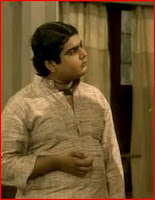 The middle classes in the 1990s were in a way the new "normal", and television, with its scores of private channels, was an apt venue (young, flexible, starry-eyed about middle-class ideals and values) to reflect this nouveau-hegemony. While even beloved Doordarshan's programming was heavily Hindu-centric, the new middle-class centred programming in the satellite era was for the first time blatantly using economic status as a marker to separate the "all-rights" from the "not all-rights". Hence, derision for and suspicion of those with a low place in the class hierarchy.
The middle classes in the 1990s were in a way the new "normal", and television, with its scores of private channels, was an apt venue (young, flexible, starry-eyed about middle-class ideals and values) to reflect this nouveau-hegemony. While even beloved Doordarshan's programming was heavily Hindu-centric, the new middle-class centred programming in the satellite era was for the first time blatantly using economic status as a marker to separate the "all-rights" from the "not all-rights". Hence, derision for and suspicion of those with a low place in the class hierarchy. The character of Karima itself reflects the interests and preoccupations of the middle classes: servants, after all, were the symbols of the middle class family's prosperity/income/class position. Perhaps the makers, when creating this character, also wanted to acknowledge the practice of the entire family - including the servant(s) of the family - gathering around the television at night to watch the popular shows. But just like the real-world servants' participation in the family dynamic was ambiguous/limited at best, Karima too would choose to stay on and show his loyalty to the Diwan family - who had earlier made fun of his aspirations to move to Dubai to work and his "modern" getup (ep. 19) - thus appeasing their class anxieties - servant-like, "though he was never treated like one by the family members."
No comments:
Post a Comment